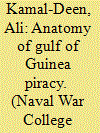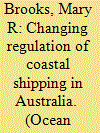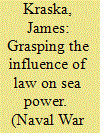| Srl | Item |
| 1 |
ID:
138700


|
|
|
|
|
| Summary/Abstract |
As a global response to piracy off the coast of Somalia was taking place, alarm bells were ringing about a similar growing insecurity in the Gulf of Guinea. Today, the Gulf of Guinea stands as the most dangerous maritime area in terms of the success rate of attacks and violence. The United Nations Security Council adopted Resolutions 2018 (in 2011) and 2039 (in 2012) expressing grave concern about the mounting insecurity in the region and its consequences for regional and global security. A United Nations (UN) team was deployed to the region to assess the situation.
2
|
|
|
|
|
|
|
|
|
|
|
|
|
|
|
|
| 2 |
ID:
128284


|
|
|
|
|
| Publication |
2014.
|
| Summary/Abstract |
Market access to coastal shipping services is often severely restricted. Most countries impose national flag requirements as a minimum. However, Australia's coastal shipping market has been more open than many other markets, allowing foreign flag access to domestic shipping through a unique permit and licensing scheme. This article assesses Australia's regulation of cabotage by examining the nature of the permits issued to foreign flag companies for domestic shipments and evaluates the changes currently being proposed against a database of permits issued in 2009 and 2010.
|
|
|
|
|
|
|
|
|
|
|
|
|
|
|
|
| 3 |
ID:
193622


|
|
|
|
|
| Summary/Abstract |
Following victory in the Russo-Japanese War, the Meiji government sought to expand its maritime influence in Northeast Asia by developing pelagic fisheries in the newly acquired Kwantung leased territory, but it encountered immediate resistance from the Qing court, which had just embarked upon ambitious reform to strengthen maritime defence through the building of a national fishing industry. The dispute first emerged as a clash between Japanese and Chinese fishery protection companies on the seas adjacent to the Chinese city of Xiongyue. It then gave rise to a protracted Sino-Japanese legal debate on the question of whether the Xiongyue fishing ground was in the free sea or part of Chinese territorial waters. However, the 1912 settlement agreement made no mention of the legal status of the fishing ground. By examining this oft-neglected dispute, this article not only provides a rare East Asian case that illustrates the tension between the requirements of national sea borders and the principle of navigational freedom, but also explores how the Meiji and Qing governments perceived and practised international maritime law at the turn of the twentieth century. It argues that neither government viewed international maritime law as the only referential framework to solve the dispute, especially when it contributed little to the conflict settlement and contradicted their perceptions of the historical relations between East Asian countries.
|
|
|
|
|
|
|
|
|
|
|
|
|
|
|
|
| 4 |
ID:
092697


|
|
|
| 5 |
ID:
085464


|
|
|